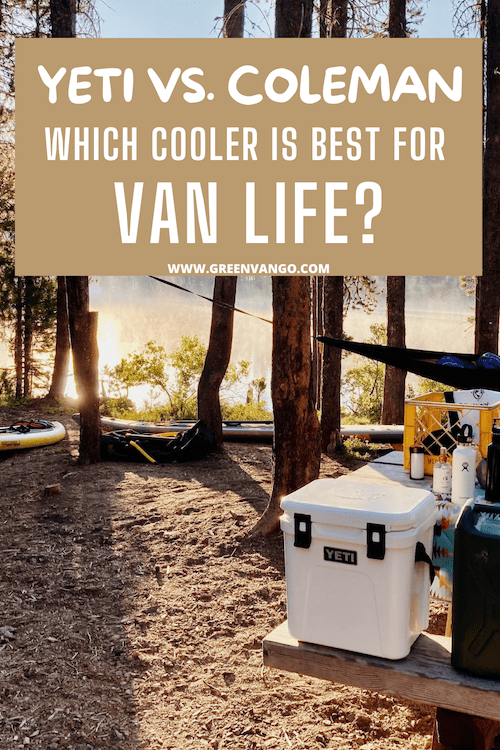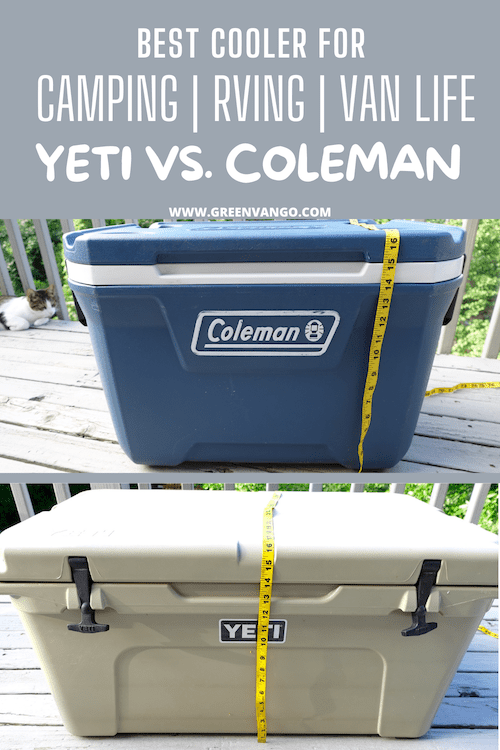Hide Comments
Skip to content
Skip to sidebar
Skip to footer
When it comes to van life without a fridge, the cooler you use can have a big impact on your van life meals. I’ll be comparing two of the biggest names – a Coleman vs YETI cooler.
I switched off between using the Coleman 316 Series cooler and the Yeti Tundra 65 cooler for months at a time in my van.
You’re probably thinking, “Yeti vs Coleman? There’s no comparison – Yeti wins!”
But in budget van life, space is limited, maneuvering around is tough, and you need products that minimize effort. There’s more to base your cooler choice on than just how long it keeps your food cold.
Note: This post may contain Amazon, Coleman or YETI affiliate links which I will make a small commission on at no extra costs to you.
| Quality | YETI Tundra 65 | Coleman 316 Series 52 qt. |
|---|---|---|
| Bulkiness | Loser | Winner (less bulky) |
| Weight | Loser | Winner (lighter) |
| Storage Space | Tie | Tie |
| Price | Loser | Winner (cheaper) |
| Durability | Winner | Loser |
| Design | Winner | Loser |
| Food Chill Timespan | Winner | Loser |
| Security | Winner | Loser |
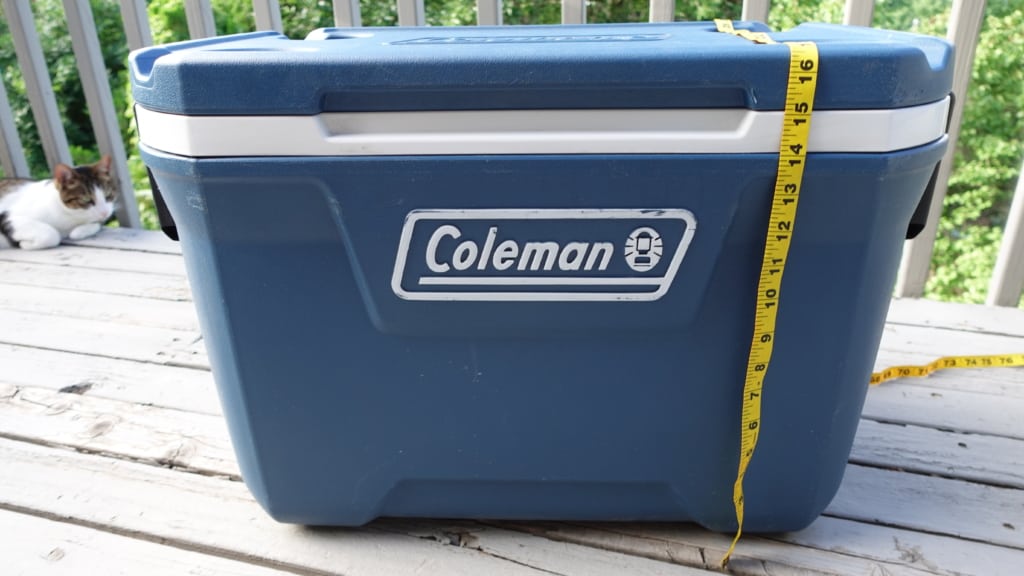
I bought the Coleman 316 (52 qt.) at WalMart for a modest $50 a couple of years ago. I wanted a cooler that would serve as my “mini fridge” that I could also easily store away.
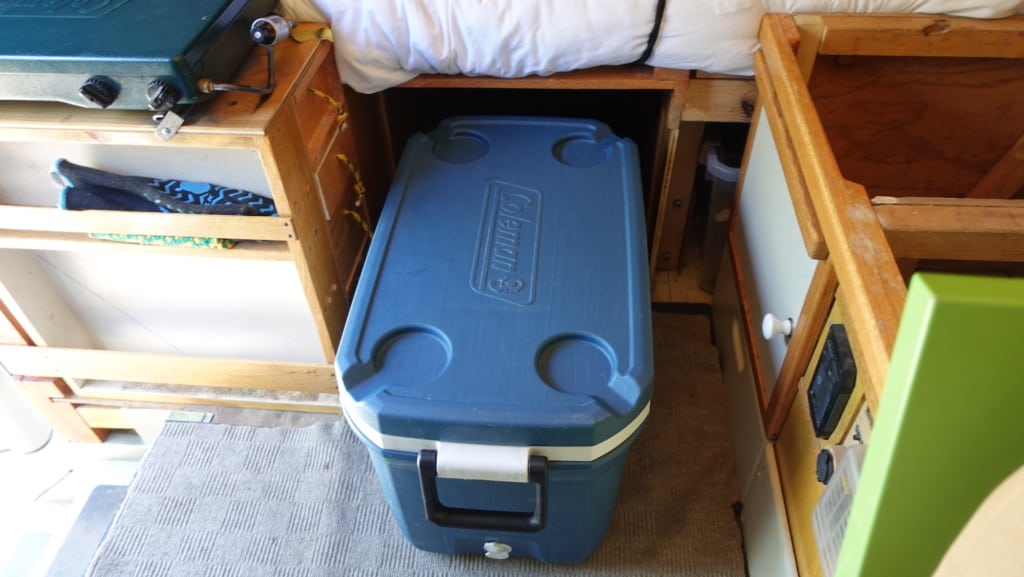
The Coleman 316 was a perfect fit for sliding underneath my van’s benches. It’s more of a tall, slim build and the dimensions were perfect for what I needed. Having a cooler small enough to fit underneath the benches meant it would stay more chilled being tucked away and not take up precious living space in the van.
The Coleman 316 Series also comes in different sizes, some with wheels. But for van life, I definitely didn’t need wheels!
Weighing just a few pounds, the Coleman 316 is very easy to slide in and out from my benches and remove from the van to drain water. And when I’m draining the cooler on at least a weekly basis, it’s critical that I can do it easily and efficiently.
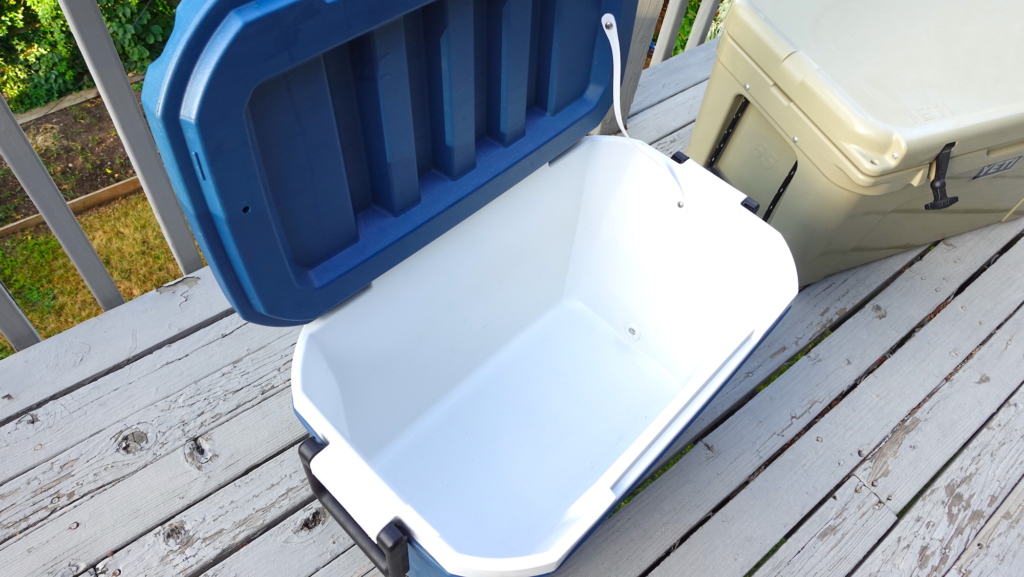
This version of the Coleman 316 offers 52 quarts of storage space, and can supposedly hold up to 80 cans.
I’m impressed at how much storage space this cooler offers. Since the cooler walls aren’t very thick, it provides more internal storage space. Even though it’s a physically smaller cooler than the Yeti Tundra 65, its holds just five quarts less.
You can’t beat $50 for a cooler you’re going to use full-time as your “fridge”. The tried and true Coleman name delivers on a quality get-what-you-pay-for product.
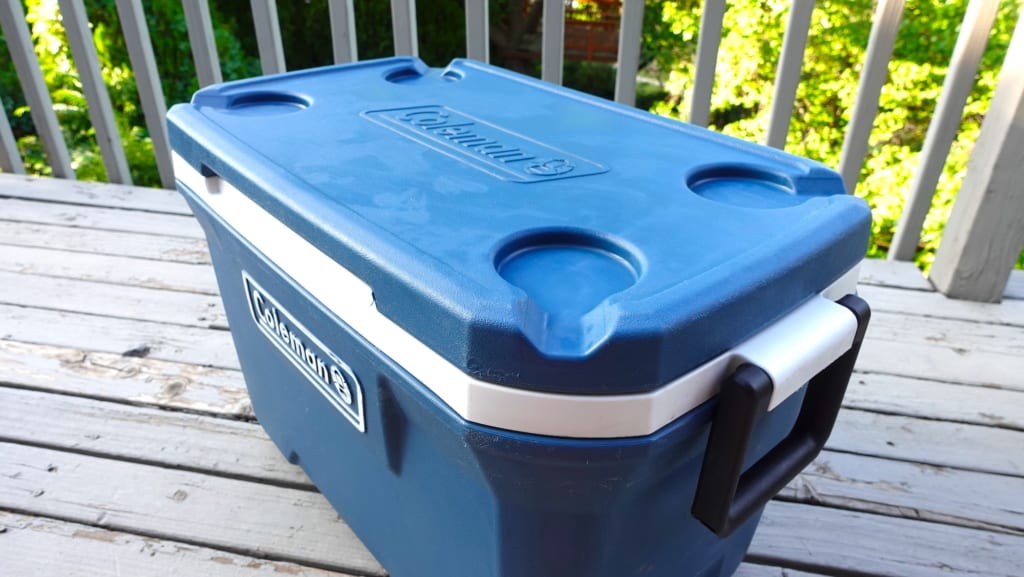
You can get a lot of good years out of this cooler if you treat it with care. I’m going on three years with mine, and I let renters use it when they rent out my van! But unlike the Yeti, if you’re tough on it, it will probably break.
I would pull the cooler out from underneath my benches and use it as an extra seat for guests in the van sometimes. But the thin, plastic lid would bow underneath someone’s weight and I knew it wasn’t doing the cooler any favors. It also has a decent gash on the exterior bottom–no idea how it happened and it hasn’t cracked the plastic, but it has definitely weakened the area.
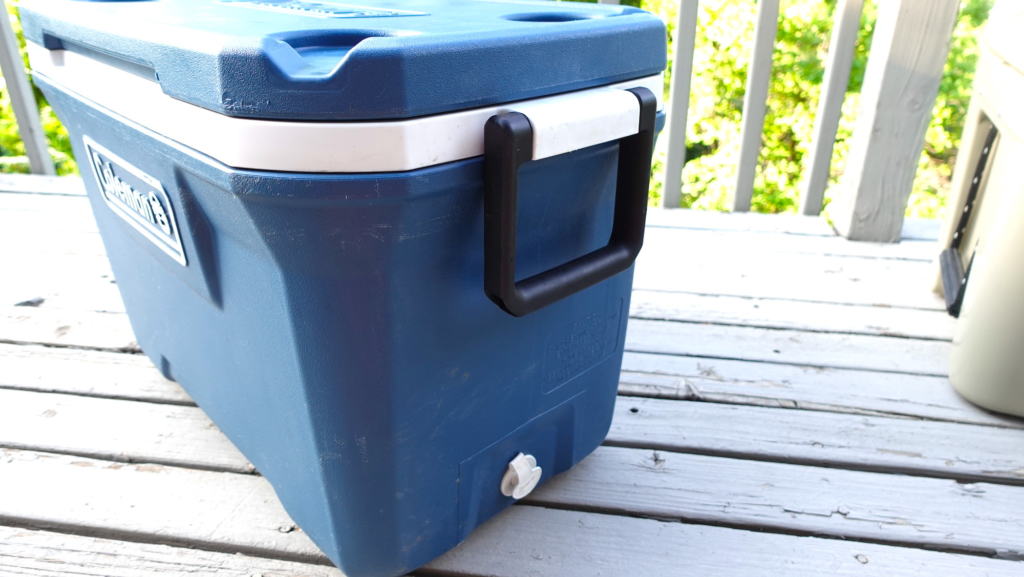
The drain plug is not going to come loose on its own, but it could be easy to bump and accidentally open. It’s just a piece of plastic that plugs in. But the side handles are great, lightweight and easy to use.
I love how much storage space this cooler offers, but it’s deep and narrow shaped. This makes it hard to quickly reach in and grab what I’m looking for. Instead, I end up stacking items and digging around, which causes me to leave the lid open longer and disrupt the ice, which significantly reduces the ice’s ability to stay cold.
I also end up with food buried at the bottom, and on my never-ending quest to find good tupperware for van life, my food still gets waterlogged.
I was getting about 2-3 days of cooler “coldness” from my Coleman 316 Series. By the end of day 3, my food items would be swimming in cold ice water. Coleman states themselves this cooler is designed to keep ice for a maximum of 3 days, in up to 90 degree weather. It doesn’t help that I don’t have a way to pre-chill my cooler and I’m usually boondocking in the hot desert.
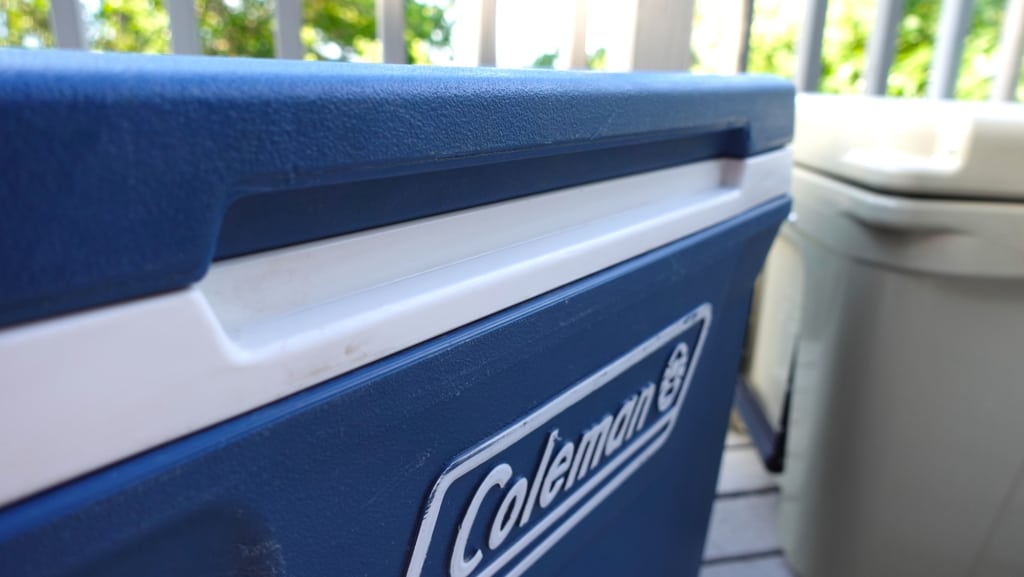
The cooler doesn’t have a lid latch; it just relies on the natural suction of the lid to keep it closed. But sometimes I couldn’t get the (extremely lightweight) lid to lay flat if my cooler just had a little too much ice in it. Nevermind if I accidentally knocked the cooler over, there’d be nothing to stop it from spilling everywhere.
I absolutely love how lightweight this cooler is; it made taking it in and out my van every few days to empty, a non-issue. But the downside is that it’s made of thin plastic which doesn’t hold up well if put under stress.
And the big, obvious factor: it just doesn’t keep my food cold for as long as the Yeti can.
If you take care of your Coleman 316 Series cooler though, and you don’t mind having to re-stock on ice every few days, it’s a very budget-friendly cooler option for van life!
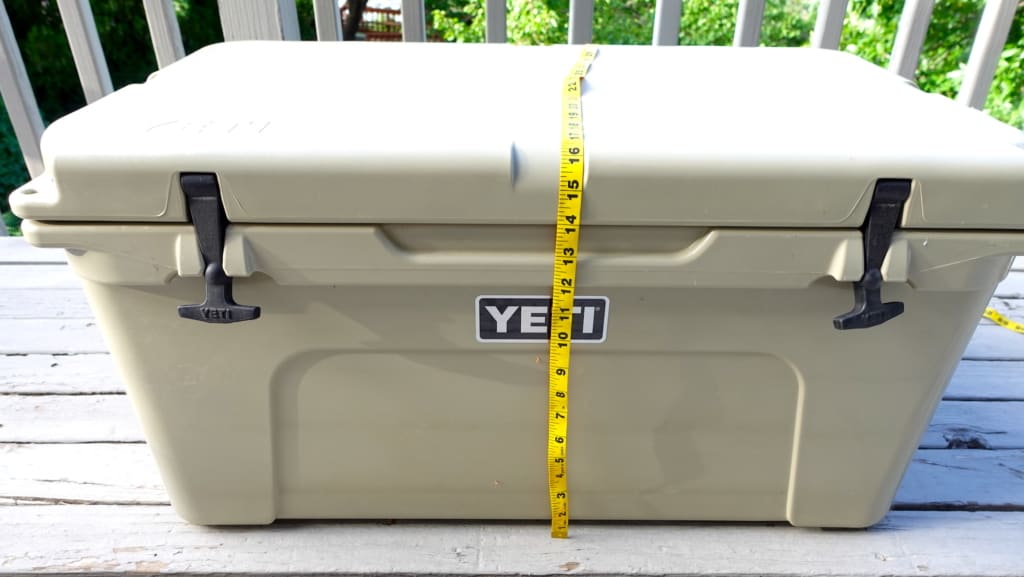
I was gifted the Yeti Tundra about halfway through my full-time van travels and was pumped. No question, I wouldn’t have this cooler if it weren’t given to me as a gift. The Yeti Tundra 65 has a price tag of $375, which was definitely out of my budget!
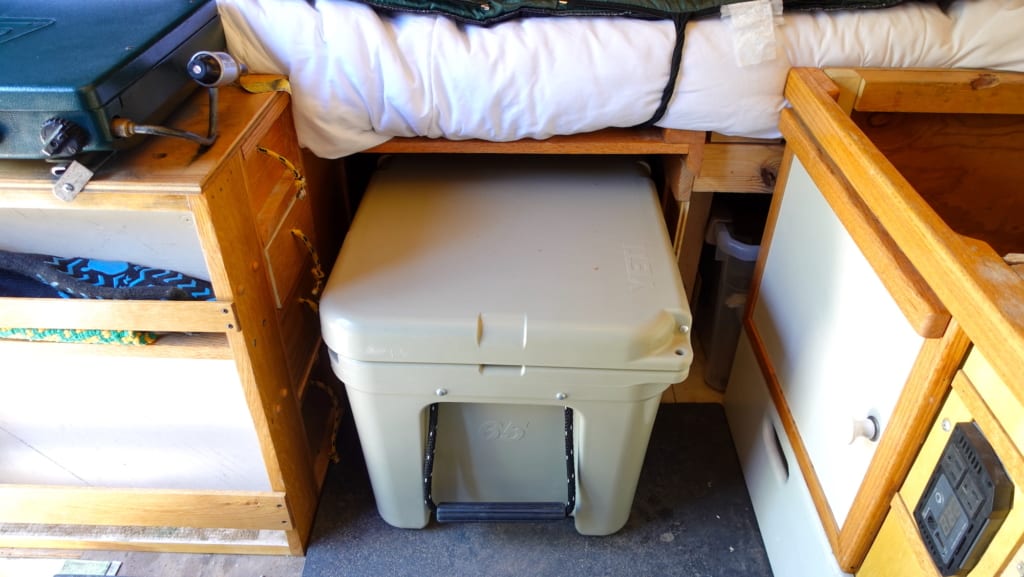
The Yeti Tundra is wider but just barely shorter than the Coleman 316. Given my van’s storage space, these are slightly more difficult dimensions to work with than the Coleman’s dimensions.
The weight of the Yeti Tundra 65 is its biggest pitfall for me: it weighs 35 pounds empty. There is nothing easy about pulling this cooler in and out from underneath my van benches. Nevermind bringing it outside to drain water. The bulkiness and weight, combined with my van’s small space, makes maneuvering this cooler a butt ache.
It became such a hangup that I actually bought a short hose and cooler drain plug so I could simply attach a hose to the cooler for draining. This way, I could leave the cooler in the van while it drained. But that posed a new problem, because switching out the plug for the hose meant opening up the valve–which would result in water pouring out.
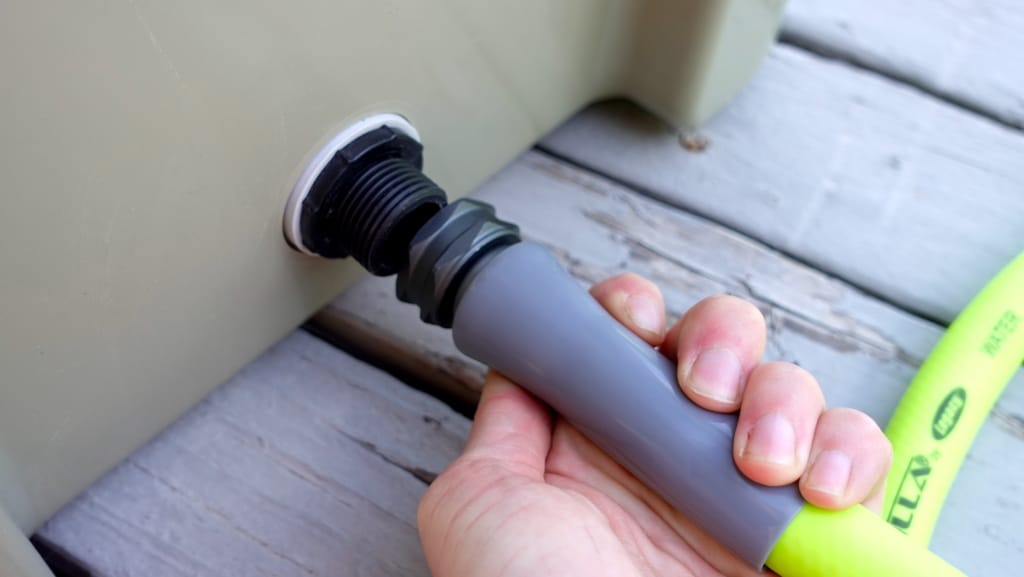
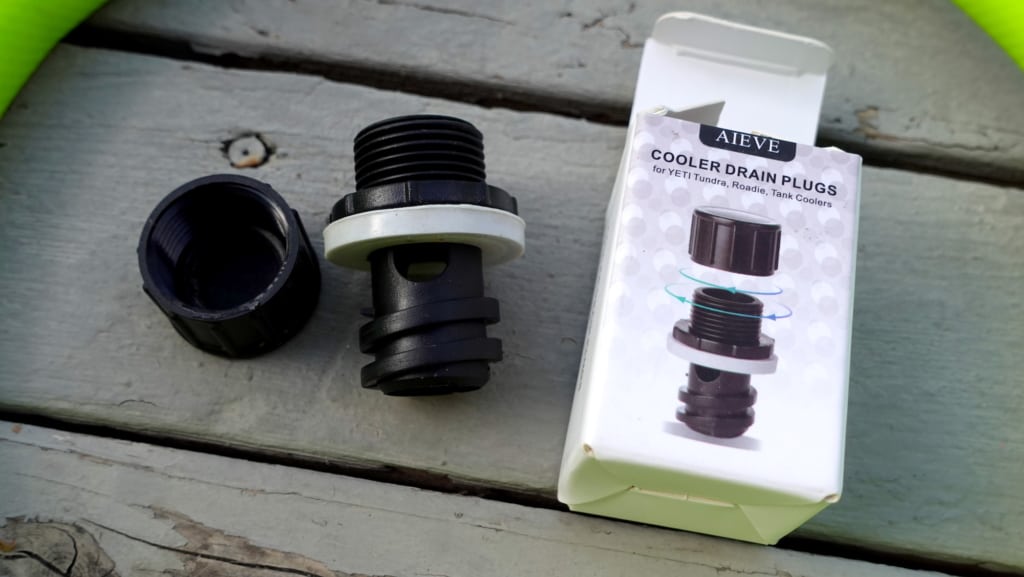
So if I want to use this method, I have to keep the hose attached to the cooler and plug up the hose. When I want to drain the cooler, I hold the hose up higher than the cooler so I can remove its plug without water pouring out. It usually still results in some spilled water.
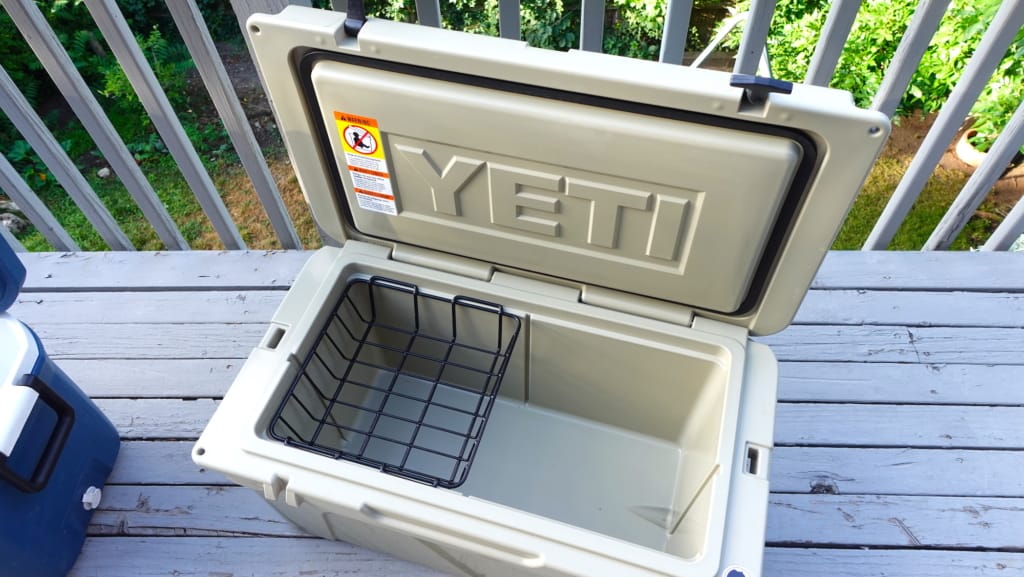
The “65” in “Yeti Tundra 65” is supposed to represent the number of quarts it can hold–but due to its thick insulation, it really holds closer to 57 quarts.
That being said, it comes with a cooler basket that is an absolute game-changer. I can keep certain foods in the cooler basket so they don’t get waterlogged. The basket also helps me quickly access items without needing to dig around in the cooler, which minimizes the time I have the lid open, ultimately preventing cooled air from leaking out.
It’s no secret that Yeti is one of the most expensive cooler brands on the market. This particular Yeti cooler currently costs $375, which is only mid-range price for Yeti coolers.
Yeti prices vary between $200-$1300!
But given there are more videos popping up of Yeti coolers still keeping drinks cold after being in a FIRE–it’s a pretty justified price tag.
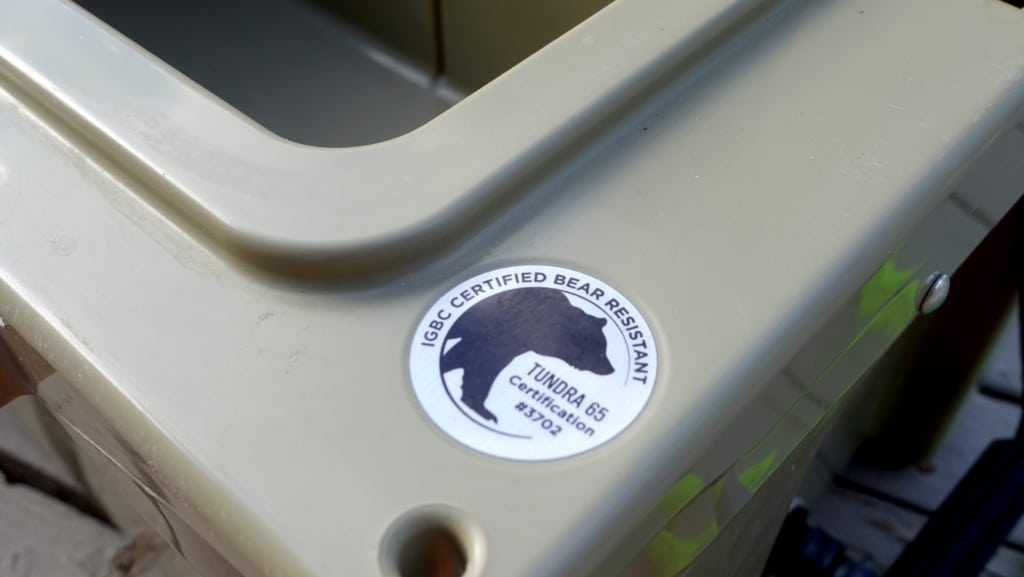
One of the biggest justifications for the high price tag is the incredible durability of these coolers. Yeti coolers are IGBC certified bear resistant–even a bear can’t get in this thing. I can send my Yeti cooler to hell and back and I’ll still be pulling out a cold drink! I don’t mind if it gets a ding here or a kick there; its walls are so thick that I have zero worries about it doing real damage.
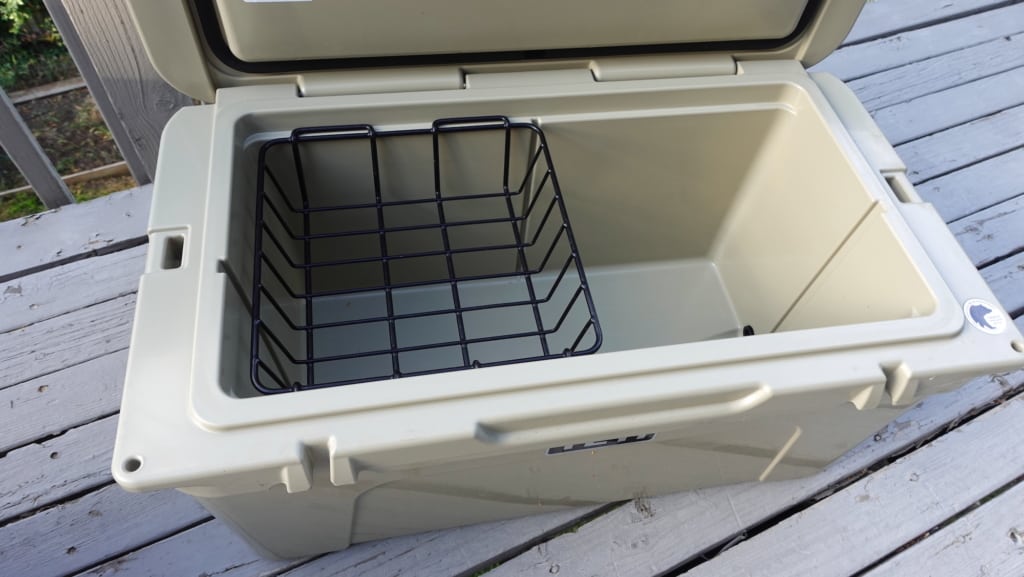
As mentioned, the internal storage space is more limited in Yeti coolers because of their thick walls–this cooler really has 57 quarts of storage space, not 65 quarts. But the basket is such a simple and effective use of space (the Yeti Tundra 65 comes with a basket). I can keep my delicate food items in the basket so they don’t get bruised, overly cold or waterlogged.
The rims of the cooler also have loop holes. Maybe you want to rope down your cooler in the back of a truck, or secure it to the interior of your van. These sturdy, simple holes make this very easy to accomplish.
I was getting about 4-6 days of cooler “coldness” from my Yeti Tundra 65. Its rotomolded build and double-layer insulation kept the ice colder longer, which in turn made the cooler more like a fridge. So even my items in the cooler basket stayed very cold even though they weren’t in ice. It was amazing!
I’ve been told that Yetis are most effective (like any other cooler) if they are chilled before putting ice in them. If I’m using the Yeti at home, I’ll take whatever ice is in my icebox and put it in my Yeti before packing it up with food and store-bought bags of ice. But in van life, I didn’t have that option. So I think I could’ve increased the cooler chill by a day if I could keep the internal storage colder before putting my food and ice inside.
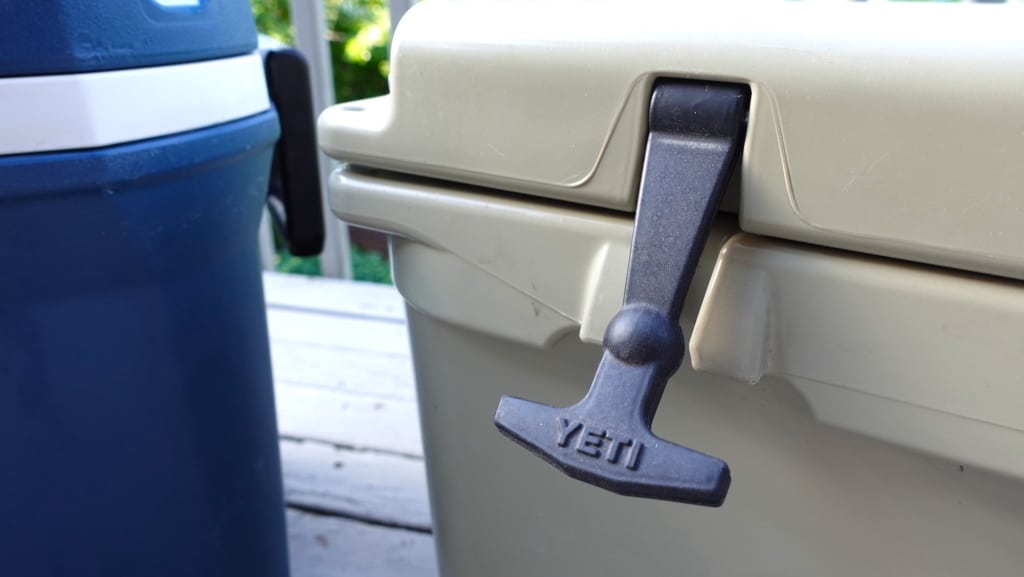
The cooler’s lid is heavy so it naturally wants to stay closed, even if it’s slightly overfilled with ice. The two stretchy, rubber latches make for a quick way to secure the cooler closed.
Personally, I don’t love the rubber latch style because sometimes I struggle to pull the latches down hard enough for them to secure in place. But I think a lot of this design has to do with keeping it bear-proof.
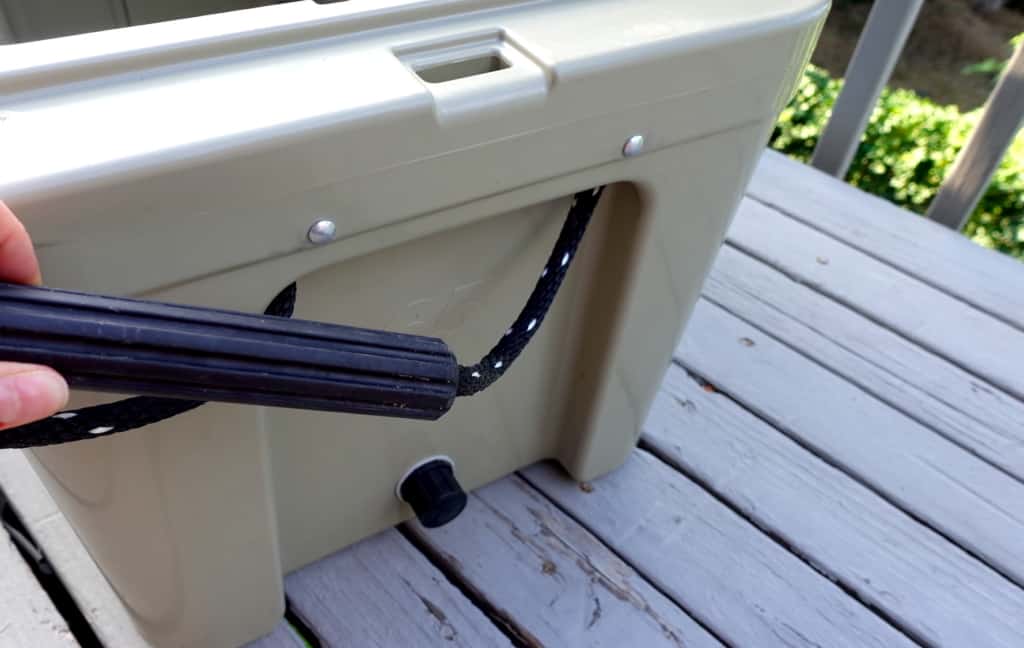
The Yeti Tundra is definitely built for rugged outdoor use for long-term stints. You’d think it’d be the no-brainer selection for van life–and in terms of food chilled-ness and durability, it is.
But as mentioned, its weight and bulkiness make it very difficult to move around, and oftentimes in van life, you need to shift stuff around in your van.
If I stored this cooler at the back of my van so I could simply access it from my backdoors, it’d make draining out the water 100 times easier. But I didn’t want to have to exit my van in order to get to my cooler, which is why I ended up struggling to find a system for easily draining it.
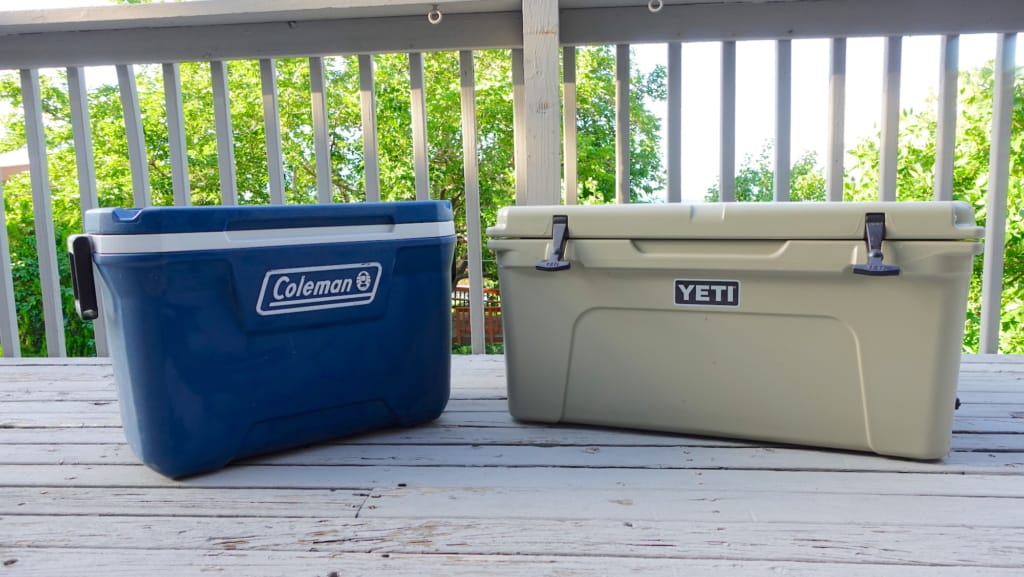
Sorry to break your heart with a cop-out answer, but I can’t say one is better than the other! It all depends on your cooler needs.
There you have it! After over a year of using these style coolers, I hope this review helps you make a decision. And no matter which cooler you use, check out my hacks for keeping ice cold the longest in any style cooler!
